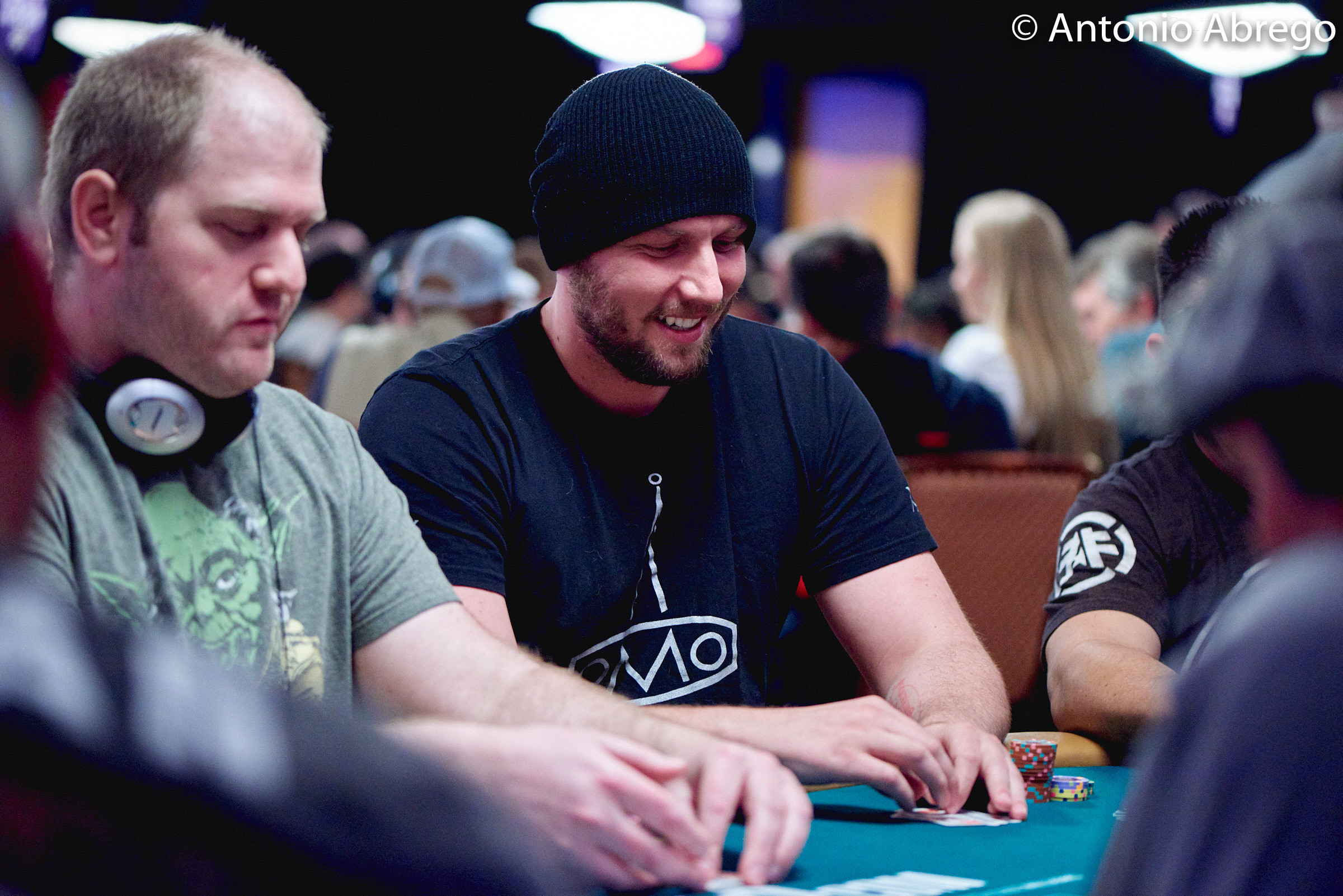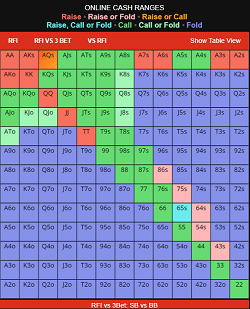- Poker tournaments and cash games have some fundamental differences. It’s important to clearly understand the distinction so you can adjust and implement the optimal strategy. We’ll cover the nuances, why it affects your approach, and how to model your style to.
- Think about it, in a cash game, your value comes from being better than your opponent, and being able to exploit that difference in skill through thousands of hands worth of time. In guaranteed prizepool tournaments with a killer overlay, however, the value from these tourneys comes immediately after.
- Because of the variety of stack depths at play in tournaments, ranges are far more dynamic than in cash games. For example, deep-stacked players will often raise with a much wider range of hands than short-stacked players. The former is able to exert a lot of pressure on the latter by doing so.
Poker tournaments and cash games have some fundamental differences. It’s important to clearly understand the distinction so you can adjust and implement the optimal strategy. We’ll cover the nuances, why it affects your approach, and how to model your style to give yourself the best chance to win. Keep in mind that playing tight aggressive is normally best. Poker is generally won by understanding the odds, and by putting your opponents on an accurate range of hands.
But live players know that the chips are different for online poker tournaments compared to cash games. The chips at the cash table are also known as checks; they can be exchanged for the cash value printed on the face. The poker chips at a tournament do not have a denomination printed on them. This is more than just a subtle difference.
Poker Cash/Ring Game Characteristics
Buy In: Tables have a minimum & maximum, typical for a 1/2 No Limit (NL) Hold ‘Em game is $60-300.
Re-Buys: Add chips at anytime up to the table max, or to largest stack in some games.
Pay Outs: Walk away at any time with the chips in front of you to cash out.
Blinds: Remain at the same amount throughout the game.
Fields: You’re playing only against the players at your table, never more than 9 other players.
Poker Tournament Characteristics
Buy In: A set amount that can range from $1.00 to $1 million, creating a prize pool.
Re-Buys: Most tournaments are elimination, but some have a re-buy period at the beginning.

Pay Outs: The top 10% of the field makes the money with increasing prizes for placing higher.
Free Poker Tournaments Cash Prize

Blinds: Continue to raise incrementally after a certain period of time.
Fields: There are multiple tables in the same event, ranging from 16 to 8,000+ players.
Now that you understand the characteristics, you may be asking yourself how it affects your play? Here’s the answer… the blind structure. As soon as the tournament starts, it’s like driving a new car off the lot, your chips immediately start to depreciate in value. In poker tournaments, because their is a clock, and the blinds increase, there is even more reason to justify playing aggressively and going after more chips.
A lot of new and experienced players think in terms of surviving to the end in order to make it into the money. I understand why someone may feel this way, but this mindset can be detrimental to your success. The reality is that although 10% of the field gets paid in poker tournaments, the significant amount of cash is paid out by making the final table.
This doesn’t mean you should play recklessly, but use calculated aggression. Pick good spots when you have the best hand or good odds. Try to play pots while in position. Make bluffs when you think your opponent will fold. Get maximum value by making bet sizes anywhere from half pot to full pot. If you think your opponents are weak and they’ll likely fold, bet. If you’re bluffing and get check-raised, fold.
The bottom line is, you need to get more chips. Don’t be afraid of getting knocked out of a tournament, nobody wins them all! Be selective with the hands you play, and make the most out of your hands. Bet or raise when you think you can get opponents to call with worse. Slowplay when you think nobody will call a bet, like if you have the deck crippled holding AK on an AAA flop. Play aggressive, and have fun.
Cash games should still be approached in an aggressive manner, but because the blinds don’t increase you will typically have much deeper stacks; the amount of chips you have relative to the big blind (BB). So in later stages of a tournament you may 3bet jam ALL-IN pre-flop with 77 and AQ with a 10BB stack, where as in a cash game you may 3bet that part of your range with a 150BB stack, and likely see a flop, unless they 4bet or fold.
Free Poker Tournaments
“This post was shared on the Alec Torelli’s Best of Poker Series“
We all love Omaha but, as with any poker variant, there are drastic differences between Omaha tournament play and cash games. We will look to introduce you to some of the differences between the two which, might look minor on the face of things, but can have a very dramatic impact on game-play, attitude and strategy.
For instance, cash game poker typically refers to games in which players can purchase chips at any or all times. Sure, there is a set buy-in but, as long as you meet the minimum amount, your place at the table is assured. Obviously, this means that some players at the table will have more fire power than others. After all, people will buy-in with differing amounts. In contrast, in tournaments, players buy-in for the same amount, beginning with the same amount of tournament chips.
Omaha cash games are played on one table while tournaments take place on multiple tables, hence the abbreviation MTT, which literally stands for multi table tournaments. In cash games, you can pick up your chips and “cash out” when you’ve had enough. Not so in tournament poker where elimination is your ‘only’ way out with play only ending when there is one person left standing.
Also, blinds stay the same for each hand in cash games, depending on the stakes at least, where-as in tourneys the blinds increase on a timed basis. Also, unless stated as a re-buy, most tourneys will freeze you out of the game should you bust but in cash games, you can buy yourself back in and continue playing. And that is the key distinction to the two games.
Tournament Omaha Poker
Because, in Pot Limit Omaha (PLO), you must use two pocket cards PLUS three community cards, it is absolutely critical that you select them accordingly in order to provide as many outs as possible. Position is another important factor in PLO. Check your aggression too, not only build your stack but use it. In short, be ruthless.
In fact, during a deep PLO tourney run, you will need to accumulate chips and build your stack as early as possible. This is because, sooner rather than later, you will be required to survive some close calls that could leave you hurting. Expect early limpers to be vulnerable so make them your ‘bounty’ but, as you move into the mid-stages and beyond, be aware that calls will get harder.
Look out and be ready to seize upon opponents overvaluing pairs, both higher and lower, both of which are almost unplayable and are a very common mistake in PLO. Reading hands in PLO may be tough, but there is some good news; Many players will inadvertently give away their hand strength.
Check-raising is a bad idea in Omaha poker. Players will often check while holding the nuts when in actual fact they would be far better off betting. Betting a lot of hands is a far better move and provides unpredictable cover so long as you be sure to mix it up. You need to stay on your guard in an Omaha tourney as it’s more complex and one wrong move could cost you the whole game, which isn’t the same as in cash games.
Cash Game Omaha Poker
As cash games are not played as life and death, you have more time to pay attention to the basics without the panic of final elimination. And, with PLO there are some key basics that you must stick to and remember. Like over-valuing Aces and other big pairs – which might just pay off in Hold’em but will almost certainly let you down here. For example, folding over-pairs in response to a raise is a standard move in PLO.
It’s not only over-pairs that can hurt you, smaller flushes can also often prove costly as players nominally stay in the hand if they happen to be drawing to the nuts, so a lower flush, that could nick a win in Hold’em, will end up lifeless here. Drawing to the nuts is always the smart move by the way. If you’re not, someone else is and will end up crushing you.
Why They Are Played Differently
There are many ways in which cash games are different to tournaments but two key elements stand out, variance and re-buying. Taking the latter first, busting in a tournament is a disaster which is simply not the case in a cash game, where, if you can afford to continue, you can.
This is not to encourage reckless play, simply to highlight that playing under the threat of a freeze-out and knowing that you can buy back in, means that players can have entirely different mindsets.
In cash games there are times when you will be required to put all your chips on the line knowing you might not win the hand. As is the nature of the game, some of these moves will work in your favour, some won’t and, if it doesn’t, you can just re-buy-in anyway.
The re-entry factor simply means that you can, money permitting, call more often than not despite knowing that, more often than not, you will lose the hand. In tourneys, you won’t be calling anywhere near as much and if you did it would largely depend on your stack, the blind levels, how close you are to the bubble or other defining factors. In a cash game, these things simply don’t factor.
You must also consider the variance, of which cash games have less. Cash games have less swing because coolers, and heaters for that matter, have less impact and when they do hit their implications are less extreme and much more manageable.
In tournaments, however, the money only comes at the end when the remaining players have reached the final table. Any tournament players among you know how hard it is to make it that far.
Conclusion
In the end, the key differences between tournament Omaha and cash game Omaha are enough to impact on key elements of the game. In fairness, the same essential rules are true. Elimination in a Hold’em cash game is easily rectified but terminal in a tournament. So the main distinction lies in the game itself. These are the complexities that make Omaha poker unique and offer more to consider than its relative variants. There is just so much to factor in in Omaha that, cash game or tournament, you are sure to have a great, and hopefully profitable, time.